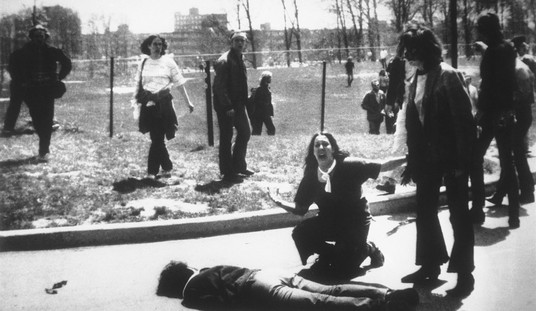What Happened to Donald Rumsfeld?
In the usual Washington script, an administration official who resigns usually becomes embittered, and then signs a contract for an expose book about his former colleagues—or at least goes on 60 Minutes for a tell-all, ‘they, not me, did it’ interview.
But not quite all. I recently had lunch and spoke at length with former Secretary Donald Rumsfeld for an afternoon. He was cheerful, upbeat, without visible bitterness—and extremely busy.
Doing what?
Almost everything. He is setting up foundations to fund small businesses with micro-loans in third-world countries, especially in Afghanistan. He also envisions funding a program to bring young scholars to Washington for a year of graduate study. Over the past 40 years he has compiled over 1 million pages of personal documents, memos, and correspondence. He has given all of these to the government—but in a very unique way. Rumsfeld, again at his own expense, is having computer experts create digital software that would allow the documents to be scanned, automatically collated, and indexed—and yet appear in their original manuscript form.
He is also beginning to write his memoirs—but not a get-even quick riposte, but rather a long scholarly account of what he has seen and learned in Washington as a Congressman and Defense Secretary.
What struck me in the long conversation with him was the absence of anger or bitterness about his resignation. And unlike Gen. Sanchez who has proclaimed Iraq essentially lost, Rumsfeld was full of praise for Gen. Petraeus, and complimentary even of those who were his critics.
I think over time, given his leadership in restructuring the military, and overseeing the removal of the Taliban and Saddam Hussein, that history will be far kinder than the present convenient writ that he somehow was responsible for the 2003-6 turmoil in Iraq. In any case, there is no question that he is a man of integrity and willing to let history judge his service to the country. The United States was lucky to have him—and will not forget the pictures of him out in the crowd, with smoke everywhere, on 9/11 as a corner of the Pentagon burned.
“Distinguished”
Our conversation also took place about the time Stanford professors and students objected to Rumsfeld’s proposed brief presence on a Hoover task force here in Palo Alto, especially the use of the word “distinguished” in his title as a visiting fellow. In the upside-down world of the contemporary university, someone who ran a large business, was elected to Congress, and served in two cabinets as Defense Secretary surely could not be “distinguished’.
Of course, none of the public would ever question whether the myriad of “distinguished” endowed professors on campuses had actually earned such accolades by either exemplary teaching or scholarship. Larry Summers, as President of Harvard, tried to inquire about Cornell West—and we know the results.
No matter: the contemporary campus almost habitually serves as fierce critic of society with the understanding that no such scrutiny should ever apply to itself—whether that be tuition that rises higher than the rate of inflation, faculty governance that ensures no outside auditors dare question teaching competency or productivity, lifelong employment through tenure that has resulted in uniformity of belief rather than encouraged mavericks, and the steady erosion in common skills and basic education shown by recent college graduates.
Clintonism
Bill Clinton now claims he was against the Iraq war from the beginning. Really? But as President he got a resolution passed calling for regime change, bombed Saddam on the worries over his WMD program, and, according to both Time and CNN, at various times approved of his successor’s 2003 war—in line with his spouse, who voted to authorize it because, she said, that Saddam had WMD and was supporting Al Qaeda.
Two points here. One, most Americans, after the anger surrounding his tawdry departure and the pardons had slowly evaporated, feel Clinton was an ok President, although he bombed about everybody—Afghans, Balkan peoples, Sudanese, and Iraqis—albeit without losing American pilots. The economy was up, and Dick Morris ensured that Clinton triangulated enough to sound conservative, pass welfare reform, and balance the budget.
Hard call?
But that said, most Americans are still glad that he’s gone. So it is not wise for him to be so ubiquitous, snarling at Chris Wallace in a Fox interview, calling rival Democrats Swift-boaters, and bending, as usual, the truth to make himself look statesmanlike.
All he will do, if he keeps it up—and he will, given his outsized ego and need for constant stroking—is further embarrass Hillary, and remind Americans why they are glad that both are out of the White House. Remember, for Bill Clinton to give a public address is to almost ensure that he will say something that is not quite true. The $64,000 question—which is the greater incentive for him: to get Hillary Clinton elected so he can get back into the White House; or to subtly and insidiously cause her problems, so that history records there was only one Clinton, not two, and especially not one who was the first woman, might do a better job, and thereby overshadow Bill.
Hard call.
The Absence of Character
We are witness to a national trait of never accepting any culpability when it matters, and then when it does not, blaming one’s successors. Neither Richard Clark nor Michael Scheuer could find bin Laden or the 9/11 terrorists before they struck. Both blamed each other, their respective agencies, the Bush administration, and almost everyone else but themselves. Then in retirement they cashed in with books, became the darlings of the Left and provided a blueprint for others.
Now Gen. Sanchez claims we can’t win and must leave—voiced in his service to election-cycle Democrats. But, of course, the insurgency took off under his tenure, even as he assured us in sworn testimony before Congress that we had enough troops, the right tactics, and things were improving under his watch. Was he not truthful then, or now, or both?
Like many, I feel that he was unfairly demonized during the Abu Ghraib scandal, but he does his cause no favors by avoiding responsibility rather than defending his tenure.
Perhaps the most pathetic of all is an earnest and pleasant Scott McClellan who assures us—or at least according to preview excerpts from his own memoir—that he was used by various officials concerning his comments surrounding the Scooter Libby matter.
But, once again, he could have resigned in principle rather than offering a postfacto tell-all book to trash friends and make some money in the bargain. Mr. McClellan, in all candor, was also one of the most inept Press Secretaries in modern memory; his press conferences were akin to a sputtering duck in a pond of snapping crocodiles. Watching him conduct a press conference was painful, and he could make any good news seem bad, and bad news far worse.
The odd thing? Many had compassion for him—that a crony from the Texas days was promoted way over his head into a position in which he was daily embarrassed and gratuitously ridiculed, sometimes for the sheer blood sport of it all.
Leftwing Jews
I recently received an award from a Republican Jewish group in Central California and after the lecture the question arose, “Given the hostility of the Left here and abroad to Israel, why does the majority of us Jews continue to vote for liberal candidates?”
I offered a variety of thoughts on the paradox.
1. In the sixties anti-Semitism was almost an exclusive property of the far right, and Jews, rightly, saw their struggle akin to that of other minorities. So for many, the Civil Rights movement was one of liberal solidarity across the progressive ranks—and these notions die hard even in vastly changed times.
2. In a deeper sense, Jews came to the U.S. fleeing the oppression of European and Russian aristocratic prejudice, in which status was accorded only by birth, not merit or even money. It was natural that they would look to radical social reform, the end of class bias, and meritocracy—and find the liberal left in the 20th century far more sympathetic.
3. In the 1970s-1980s in one of the most brilliant political moves in modern political memory, the radical Palestinians grafted their own agenda onto that of minorities—blacks, Chicanos, women, etc—who were fellow “victims” of Western capitalist male oppression.
So suddenly few in the West questioned the fascistic agenda of Hamas, or the views of traditional tribal and Islamic culture toward gays, women, or Jews. Instead Palestinians successfully posed as victims, and tiny Israel became a big sort of American-like oppressor. Jewish groups in the United States are only belatedly discovering that radical Palestinians’ biggest supporters are on the Left, that anti-Semitism is now mostly a leftwing phenomenon, and that their former allies in the civil rights movement themselves are unsympathetic to Israel.
Investing in Defeat
Many readers persist in thinking that nothing has changed in Iraq. But the savvier Democrats know that it has. Recently I spoke off the record with some Democratic Congressmen in Washington. As one Democrat put it: “Do we really want photos of Nancy Pelosi with Assad, the “General Betray Us” ad, and clips of Hillary’s “suspension of belief” airing next fall juxtaposed to a quiet street in Ramadi or an Iraqi politicans thanking Americans for his country’s salvation?”
The Ghost of LTC Bateman
Many readers pointed out that after publishing his four volleys, Bateman has now moved on to the pages of Wikipedia to further his case—at least in the sense that a one-sided addition about his attacks was mysteriously inserted to my biography there.
More power to him or his fans. But again, his own essays speak for themselves, and their invective and absence of analysis only brought his own reputation and character into doubt. I bear him no ill will.









Join the conversation as a VIP Member